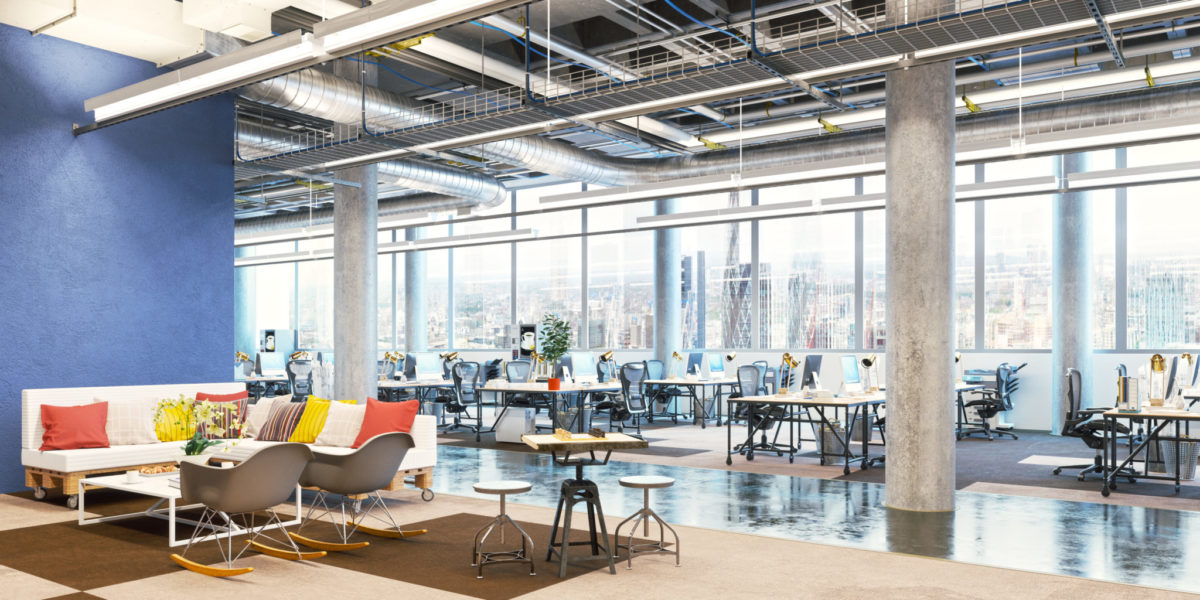I’ve been openly skeptical of many newer fads in workplace culture, namely unlimited vacation time (see my rant here), working remotely (no articles yet, but I just don’t think they work for many types of product teams), and open office floor plans.
It makes sense that as the market demand for top software talent increases, so will too the office perks, including chefs, beer, games, etc.. But, why is it that so much emphasis is placed on open environments, vs. giving engineers a dedicated space where they can have quiet and focus?
I think the answer is all in marketing and economics. These companies want to have beautiful spaces that can get featured in the press and to give prospective customers and employees impressive tours. Also, these open office environments allow employers to pack in more people per square foot.
It’s not optimized for employee productivity. Because this trend is so new, employees just go along with it, given the beautiful space design aesthetics, and try to learn to adapt once they are on board. This quickly turns into discovering how much it stinks and then starting to complain about too much noise, no place for books, whiteboard, etc.
Also, doesn’t it seem to be hypocritical when the executives at these companies all have private offices, but everyone else doesn’t? Why do they need the private space but we don’t?
Well, a new study by Harvard University was recently published showing that these negatives were not even overshadowed by a boost in worker productivity. Overall, workers spent less time with face to face conversations and more time on chat and email.
I’ve seen this play out in my own experience. Due to the open floor plan, the only way to have a 1 on 1 conversation with someone is to find a huddle room. This ends up being a big hassle, since there is never a free conference room, so people just resort to using slack or email.
Inc did a good job of summarizing this paper as well, worth the read here.
What do you think? Do you work in an ‘open office environment’ and find it to be productive? I’d love to hear what you think in the comments section below.


I work in an open office environment and love it! This is my 2nd time in this type of environment, and I have also worked in numerous office/cube environments (I’m in my early 50s). In my experience, offices create isolation while cubicles create a false sense of privacy, causing people to be less considerate to their neighbors due to the illusion of privacy. People in office are also less considerate because they think there is privacy, so conference calls on speaker phone and conversations with the door open can be quite disruptive to those in cubes nearby. Ultimately, no two environments are the same, whether you’re talking about two “open” environments or two “office/cube” environments. An open environment that is really well set up and has good sound-dampening features can be much more conducive to productive work than an office/cube environment that lacks any thought.
First, whether or not stepping into a private space is a “hassle” or not depends on how the company has set up the space. In my current job, it’s no problem at all. Plenty of small private rooms for one, two, or four-five people lining the interior walls, and electronic scheduling makes it easy to just walk in and hit the “reserve” button at the door. It also means that meetings are always on neutral ground.
Second, open environments promote more of a sense of teamwork and, yes, in my opinion, a sense of collaboration. Eye contact, a simple wave, a smile, a comment: all build a sense of teamwork that costs nothing. Everyone learns pretty quickly who is fine with casual interruption and who prefers scheduled meetings – quicker than in an office/cube environment since observation is easier. If you want to talk to someone in person, you can look up to see if they are available, or maybe walk a short way to see. in an office/cube environment you usually have to walk quite a ways to find out if someone s available (great for activity level, not so much for productivity). Once you’ve walked all that way, you’re more likely to interrupt than if you just look across and decide to wait until later.
Third, how much your specific job requires interaction versus solitude also has an impact. If you have a job that requires deep thought for long periods of time an open office can present more challenges, but then having the readily available single rooms can solve that. Also, people like this can be grouped together for a quiet environment while the people that require a lot of interaction can be on the other side of the floor.
My last job was office/cube, and I hated being in a cube (very noisy due to what I think was a perceived sense of privacy from other people in cubes and in offices) so lobbied for an office. Once I was in an office I could get the quiet I needed but felt very isolated and found my morale dropped.
Obviously, this is all based on my personal opinion and experience, and I’m sure others have different realities. I do think that the way in which the company implements the open floor plan has a LOT to do with how successful it is.